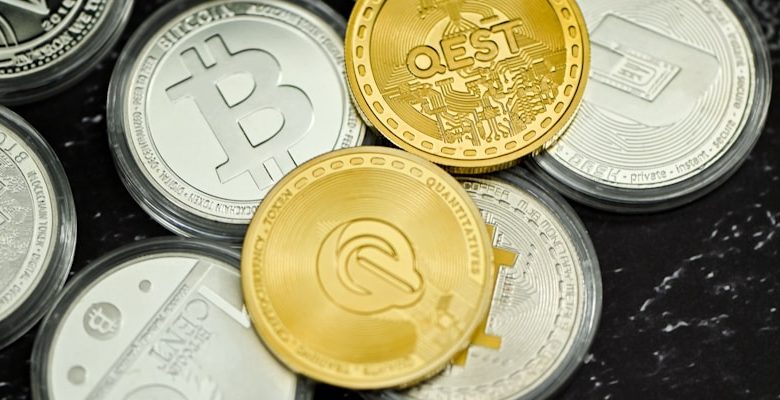The Evolution of Decentralized Finance (DeFi): Trends and Insights

- Understanding the Origins of Decentralized Finance (DeFi)
- Key Concepts in the World of DeFi
- The Rise of Decentralized Exchanges: A Game Changer for DeFi
- Exploring the Role of Smart Contracts in DeFi Ecosystem
- Challenges and Opportunities in the Evolution of DeFi
- The Future of Decentralized Finance: Predictions and Analysis
Understanding the Origins of Decentralized Finance (DeFi)
Decentralized Finance (DeFi) has been gaining momentum in the financial world, offering a new way of conducting transactions without the need for traditional intermediaries like banks or brokers. Understanding the origins of DeFi can provide valuable insights into its evolution and potential future developments.
One of the key factors contributing to the rise of DeFi is the development of blockchain technology. Blockchain, a decentralized and secure digital ledger, enables peer-to-peer transactions without the need for a central authority. This technology forms the foundation of DeFi platforms, allowing users to interact directly with each other in a trustless environment.
Another driving force behind the growth of DeFi is the desire for financial inclusion. Traditional financial systems have often excluded large segments of the population due to barriers such as high fees, minimum balance requirements, and lack of access to banking services. DeFi aims to address these issues by providing open and accessible financial services to anyone with an internet connection.
The concept of decentralized autonomous organizations (DAOs) has also played a significant role in the development of DeFi. DAOs are self-governing entities that operate based on smart contracts, allowing for transparent and automated decision-making processes. This model has been adopted by many DeFi projects to create decentralized governance structures.
Overall, the origins of DeFi can be traced back to a combination of technological advancements, the need for financial inclusion, and the rise of DAOs. By understanding these roots, we can better appreciate the unique characteristics and potential of decentralized finance in reshaping the future of the financial industry.
Key Concepts in the World of DeFi
Understanding the key concepts in the world of decentralized finance (DeFi) is crucial for anyone looking to navigate this rapidly evolving landscape. DeFi encompasses a variety of innovative financial applications and platforms that operate without traditional intermediaries, such as banks or brokerages. By leveraging blockchain technology, DeFi offers users greater financial autonomy and access to a wide range of services, from lending and borrowing to trading and asset management.
- Smart Contracts: Smart contracts are self-executing contracts with the terms of the agreement directly written into code. They automate the execution of transactions and enable trustless interactions between parties.
- Liquidity Pools: Liquidity pools are pools of tokens locked in a smart contract that users can trade against. They play a crucial role in decentralized exchanges by ensuring there is enough liquidity for trades to be executed.
- Decentralized Exchanges (DEXs): DEXs are platforms that facilitate peer-to-peer trading of cryptocurrencies without the need for a central authority. They provide users with greater privacy, security, and control over their assets.
- Yield Farming: Yield farming is the practice of staking or lending cryptocurrencies in DeFi protocols to earn rewards in the form of additional tokens. It allows users to maximize their returns on investment by leveraging various DeFi strategies.
- Governance Tokens: Governance tokens are tokens that give holders voting rights in decentralized autonomous organizations (DAOs). They allow users to participate in the decision-making process regarding protocol upgrades and changes.
Overall, these key concepts form the foundation of the DeFi ecosystem, empowering users to engage in a new paradigm of finance that is open, permissionless, and inclusive. As DeFi continues to grow and evolve, staying informed about these concepts will be essential for navigating the opportunities and risks that come with this groundbreaking industry.
The Rise of Decentralized Exchanges: A Game Changer for DeFi
Decentralized exchanges (DEXs) have been gaining popularity in the world of decentralized finance (DeFi) due to their ability to provide users with a more secure and transparent way to trade cryptocurrencies. Unlike centralized exchanges, which are prone to hacks and manipulation, DEXs allow users to trade directly with one another without the need for an intermediary.
One of the main advantages of DEXs is that they give users full control over their funds. Users are not required to deposit their assets onto the exchange, reducing the risk of losing funds in the event of a hack. Additionally, DEXs operate on blockchain technology, which ensures that all transactions are recorded on a public ledger, making them transparent and immutable.
Furthermore, the rise of DEXs has led to the creation of decentralized autonomous organizations (DAOs) that govern and manage the operations of these exchanges. DAOs are typically governed by token holders who vote on important decisions, such as listing new tokens or changing fees. This decentralized governance model ensures that DEXs remain community-driven and transparent.
Overall, the rise of decentralized exchanges is seen as a game changer for DeFi, as it provides users with a more secure, transparent, and user-centric way to trade cryptocurrencies. With the increasing popularity of DEXs, it is expected that decentralized finance will continue to evolve and revolutionize the traditional financial system.
Exploring the Role of Smart Contracts in DeFi Ecosystem
Smart contracts play a critical role in the decentralized finance (DeFi) ecosystem by automating the execution of agreements and transactions without the need for intermediaries. These self-executing contracts are coded to enforce the terms of the agreement between parties, ensuring transparency and security in DeFi protocols. By eliminating the need for intermediaries, smart contracts reduce costs and increase efficiency in DeFi transactions.
One of the key benefits of smart contracts in DeFi is their ability to enable programmable money, allowing for the creation of complex financial products and services. Through the use of smart contracts, DeFi platforms can offer lending, borrowing, trading, and other financial services in a trustless and decentralized manner. This opens up new opportunities for users to access financial services without relying on traditional financial institutions.
Furthermore, smart contracts enable composability in DeFi, meaning that different DeFi protocols can be combined and interact with each other seamlessly. This interoperability allows for the creation of innovative decentralized applications (dApps) that leverage the strengths of multiple protocols. As a result, DeFi continues to evolve rapidly, with new projects and protocols being developed to address various financial needs.
Overall, smart contracts are a foundational technology in the DeFi ecosystem, driving innovation and transforming the way financial services are delivered. As the adoption of DeFi continues to grow, the role of smart contracts will become even more central in shaping the future of decentralized finance.
Challenges and Opportunities in the Evolution of DeFi
As decentralized finance (DeFi) continues to evolve, it presents both challenges and opportunities for the financial industry. One of the main challenges is the need to address security issues that have plagued the DeFi space. With the rise of hacks and exploits, there is a growing concern about the safety of funds locked in DeFi protocols. This has led to a greater emphasis on improving security measures and implementing better risk management practices.
On the other hand, the evolution of DeFi also brings about exciting opportunities for innovation and growth. One of the key opportunities is the potential to democratize finance and provide greater access to financial services for underserved populations. By leveraging blockchain technology and smart contracts, DeFi has the power to create a more inclusive financial system that is not controlled by traditional institutions.
Furthermore, the evolution of DeFi opens up new possibilities for financial experimentation and creativity. Developers and entrepreneurs can now easily create new financial products and services without the need for intermediaries. This has led to a wave of innovation in the DeFi space, with projects ranging from decentralized exchanges to lending platforms.
The Future of Decentralized Finance: Predictions and Analysis
The future of decentralized finance (DeFi) is promising, with many experts predicting continued growth and innovation in the space. As blockchain technology continues to mature, we can expect to see an increase in the number of decentralized applications (dApps) being developed, offering a wide range of financial services without the need for intermediaries.
One trend that is likely to continue is the rise of decentralized exchanges (DEXs), which allow users to trade cryptocurrencies directly with one another, eliminating the need for a central authority. This trend is expected to drive greater adoption of DeFi as more people become comfortable with the idea of peer-to-peer trading.
Another area of potential growth is decentralized lending and borrowing platforms, which allow users to lend out their assets to earn interest or borrow assets by providing collateral. These platforms are expected to become more sophisticated and user-friendly, making it easier for individuals and institutions to participate in DeFi lending markets.
Overall, the future of decentralized finance looks bright, with new opportunities for innovation and growth on the horizon. As blockchain technology continues to advance and more people become aware of the benefits of DeFi, we can expect to see continued expansion and evolution in the space.



